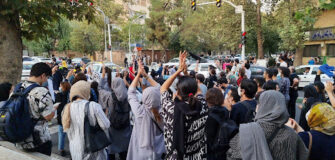Latest Sanctions Are Not Enough to Show U.S. Support of Iranian Protesters
Share

Latest Sanctions Are Not Enough to Show U.S. Support of Iranian Protesters
ILEANA ROS-LEHTINEN, SERVED IN THE HOUSE OF REPRESENTATIVES FROM 1989 TO 2019, AND SERVED AS CHAIR OF THE HOUSE FOREIGN AFFAIRS COMMITTEE
News Week | 10/14/22
On Sept. 22, the U.S. departments of Treasury and State announced economic sanctions targeting Iran’s “morality police” and seven individual security officials involved in both suppression of women’s rights and the escalating crackdown on protests over the past fewweeks.
The uprising started when in mid-September a 22-year-old Kurdish Iranian woman, Mahsa Amini, was apprehended by the morality police and accused of wearing loose head covering. According to eyewitnesses, she was physically assaulted, and later fell into a coma. Her tragic death three days later provided the initial spark for widespread protests. Since then, the Iranian people, tired of a rock-bottom economy and decades of brutal repression, have targeted the entire regime and are calling for “an end to the Islamic republic.”
Anti-regime rallies have to date surged to at least 80 cities, according to The New York Times, and over 150 cities, based on credible opposition reports. Although internet blackouts in Iran make it difficult to verify the number of casualties, dozens—close to 200 according to one tally—have been brutally killed while thousands have been detained. The real figures are believed to be much higher.
While the new U.S. sanctions are an appropriate first step, they should have been imposed the moment the White House became aware of the unrest and ensuing crackdown. Nonetheless, sanctions are an insufficient response.
Despite the Iranian regime President Ebrahim Raisi’s threats of a “decisive” backlash, “this year’s protests are different” than all previous rounds, and young people are “bolder than ever,” according to analysts.
Therefore, as it becomes increasingly clear that the current unrest rivals the scope and significance of each of the eight uprisings that have taken place since the end of 2017, the U.S. government must resolve to expand sanctions to their very limit, and to bring other democratic nations on board with a strategy for supporting the Iranian people in their push for democratic regime change.
Such strategy has been absent from the Western response to each of the previous uprisings, and the result in some cases has been devastating for ordinary Iranians. During the largest of those uprisings in November 2019, the regime systematically murdered 1,500 peaceful protesters. International actors condemned the repression in general terms but did not take measures to hold the perpetrators accountable.
A protester holds a sign with the slogan “Woman Life Freedom” in support of Kurdish woman Mahsa Amini on Oct. 1, 2022, in Madrid, following her death in Iran.OSCAR DEL POZO/AFP VIA GETTY IMAGES
That lack of accountability almost certainly contributed to Supreme Leader Ali Khamenei’s decision, a year and a half after the 2019 crackdown, to appoint Raisi as the new president of the regime. As judiciary chief at the time of that uprising, Raisi was ultimately responsible for the campaign of torture that targeted its participants for months after the 2019 protests.
After Iran’s sham presidential election in June 2021, Amnesty International’s secretary general Agnès Callamard lamented that Raisi had ascended to the country’s second highest office instead of being “investigated for the crimes against humanity of murder, enforced disappearance, and torture.” Callamard also noted that this was a “grim reminder that impunity reigns supreme in Iran.” The entire regime’s impunity primarily stems from tepid international responses to many of its crimes and crackdowns on dissent.
Raisi’s record is even more barbaric. In 1988, he served as one of four officials on the Tehran “death commission” that oversaw the systematic execution of political prisoners. Nationwide, the 1988 massacre claimed an estimated 30,000 victims, the vast majority of whom were supporters of the Mujahedin-e Khalq (MEK), which remains the leading voice for democracy in Iran and a vital driver of uprisings and anti-theocracy activism.
As a member of Congress, I supported the Iranian resistance during some of the most difficult periods, including their relocation from Iraq—where they were targets of the regime’s terrorism—to safety in Albania.
Over the past few years, the organization has set up home-grown resistance units across the country. These are teams of activists integrated in society and capable of organizing and sustaining protests. Despite mass arrests, 5,000 members of resistance units recently sent video messages to the Free Iran World Summit in July 2022, indicating their growing prowess.
Since Raisi ascended to the presidency, the regime has ramped up executions. Yet in September, the international community still shamefully gave the Iranian president an audience for his speech at the U.N. General Assembly.
Raisi’s trip to New York for that gathering raised serious questions about the willingness of the U.S. and its allies to reconsider their traditional policies of conciliation and appeasement in dealing with the Iranian regime. Recent sanctions do not resolve those questions.
If Western powers wish to demonstrate that they support the rights of the Iranian people and the notion of accountability for Iranian officials, they should not remain silent vis-à-vis the onslaught on the Iranian people and specially against defenseless protesters. Inaction is tantamount to facilitation.
It is time to recognize the rights of Iranian people to resist and rebel against brutal suppression. The resistance units deserve every support in their defense of the protesters by confronting the repressive forces.
Ileana Ros-Lehtinen served in the House of Representatives from 1989 to 2019, and served as chair of the House Foreign Affairs Committee
